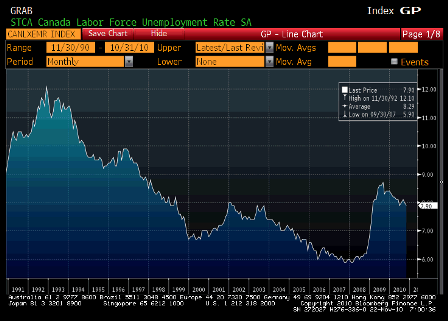Doesn’t look like Canada was all that immune from the crisis to me?
Ok, their banks didn’t fail or need data transfered from one account at the Bank of Canada to another to keep them open for business.
So what? Look what happened to unemployment- real life for real people.
And it’s still a good 2% higher than it was only a couple of years or so ago.
And we are in a resource boom.
Yes, unemployment benefits are said to be generous, so out of work people maybe don’t suffer as much financially as in other places. But taking them at their word, and if history is any guide, they would take a job at reasonable pay and produce useful output if there were jobs available.
Yes, their federal budget deficit remains too small/ unemployment too high.
And they aspire to sustaining a federal budget surplus and high net export revenues, which, if successful, means reduced real terms of trade and a standard of living lower than otherwise.
My proposal- offer a national service job to anyone willing and able to work that pays a bit more than unemployment, and then cut taxes or increase public spending (depending on politics/needs) until that pool of labor in that national service job gets down to maybe 3% of the labor force, which will also coincide with a pretty good measure of what the current full employment deficit is.


